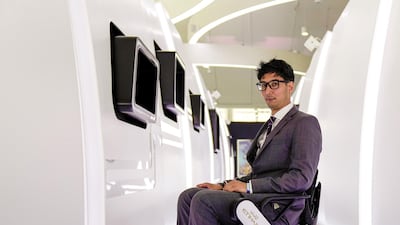Self-driving wheelchairs could be introduced at Abu Dhabi Airport as part of efforts to improve access for people with disabilities.
The autonomous devices, which are being trialled throughout the rest of the year, feature sensors capable of independently detecting and avoiding obstacles and people as they travel from one destination to another.
The airport will be electronically mapped to aid the navigation of the wheelchairs.
The final stage of the trial will include passengers with restricted mobility trying out the hi-tech wheelchairs.
Etihad chief operating officer Mohammad Al Bulooki said the project would help increase the independence of disabled travellers.
“From the organisation of the Special Olympics last year and our day-to-day operations at Abu Dhabi Airport, we saw that people want to have control for themselves,” said Mr Al Bulooki.
“This gives everyone the chance to move freely and privately, which is important to people of determination.
“People who need wheelchairs at the airport can now use them without the need to be pushed around.”
Future developments in the pipeline for the self-driving wheelchairs include up-to-date boarding times and gate information.
"We hope to be able allow restricted-mobility passengers and their families freedom of movement around Abu Dhabi International Airport, and the opportunity to enjoy all the airport has to offer," said chief executive of Abu Dhabi Airports, Bryan Thompson.
“With the beginning of these trials, we hope to ensure that this can be used safely and securely by passengers from across the globe.”

The project is in collaboration with air-transport communications and information technology company Sita, and the personal electric vehicle supplier Whill.
A similar trial was announced earlier this year between Japan's All Nippon Airways and Tokyo's Narita International Airport.
“Autonomous wheelchairs are among the latest innovations we have implemented as a company, which complement our investments in advanced immigration, security and baggage handling technologies,” said Abdulwahid Amiri, acting senior vice president of technology at Abu Dhabi Airports.
The specifications for the wheelchairs will not be finalised until closer to the launch but the top speed is believed to be in the region of 6 kilometres an hour.
The first chairs to be used in the project will also be controllable by a joystick.
Etihad's digital and innovation director, Tristan Thomas, said people often overlooked the effects of their actions on disabled people.
“Our research has shown that when people are being pushed through an airport, on a wheelchair, questions are often directed at the person doing the pushing,” said Mr Thomas.
“It is a dehumanising experience. This will allow people of determination to guide themselves through the airport.”
He said that the team at Etihad were not stopping at creating self-driving wheelchairs.
“We’re also looking at sign-language technology,” he said.
“We want to introduce a kiosk that recognises sign language in both English and Arabic.
“That will enable customers to travel by themselves when previously they would have had to be accompanied.”


